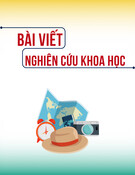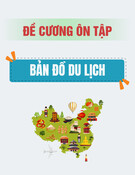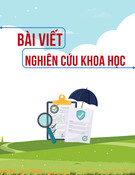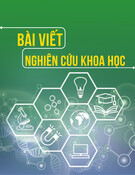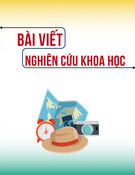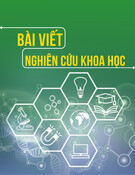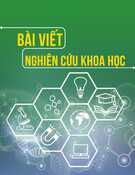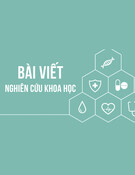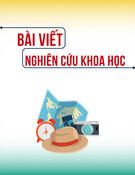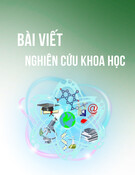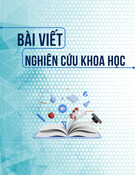
VĂN HÓA https://jst-haui.vn Tạp chí Khoa học và Công nghệ Trường Đại học Công nghiệp Hà Nội Tập 60 - Số 12 (12/2024)
128
NGÔN NG
Ữ
P
-
ISSN 1859
-
3585
E
-
ISSN 2615
-
961
9
EXPLORING STUDENTS' PERCEPTIONS TOWARDS FORMATIVE ASSESSMENT IN ENGLISH SPEAKING CLASSES AMONG TOURISM AND HOSPITALITY MAJORS
TÌM HIỂU NHẬN THỨC CỦA SINH VIÊN CHUYÊN NGÀNH DU LỊCH VÀ KHÁCH SẠN VỀ ĐÁNH GIÁ QUÁ TRÌNH TRONG CÁC LỚP HỌC NÓI TIẾNG ANH Pham Thi Thanh Thuy1,*, Tran Thi Kim Hue2, Nguyen Minh Quy2, Nguyen Thi Minh Chi2 DOI: http://doi.org/10.57001/huih5804.2024.427 ABSTRACT This quantitative study investigates the perceptions of formative assessment in English speaking classes among Tourism and Ho
spitality majors at Hanoi
University of Industry. Utilizing a survey-based approach, the research aims to explore students' perspec
tives on the role of formative assessment in enhancing
their English-speaking skills. The study employs a quantitative methodology, utilizing survey questionnaires as the primary data collection
instrument. An online
version of survey questionnaires was se
nt to 420 students studying Tourism and Hospitality majors from various academic years, ranging from second to fourth
year. The findings show that most participants view formative assessment as suitable for improving speaking skills, with role-play identif
ied as the most effective
method. Regular feedback supports students' English-
speaking improvement, and teachers play a vital role by providing guidance. Formative assessment also
enhances self-assessment, confidence, and encourages self-reflection and act
ive participation. While opinions differ on formative assessment’s impact on overall
learning, it is regarded as effective in meeting language proficiency requirements in Tourism and Hospitality. Keywords: Tourism and hospitality, students’ perceptions, formative assessment, English speaking skills. TÓM TẮT Bài báo trình bày nghiên cứu định lượng điều tra nhận thức về đánh giá thường xuyên trong các lớp học nói tiếng Anh củ
a sinh viên chuyên ngành Du
lịch và Khách sạn tại Trường Đại học Công nghiệp Hà Nội. Sử dụng phương pháp tiếp cận dựa trên khảo sát, nghiên cứu nhằm khám phá quan điểm củ
a sinh
viên về vai trò của đánh giá thường xuyên trong việc nâng cao kỹ năng nói tiếng Anh. Nghiên cứu sử dụng phương pháp định lượng, với bảng câu hỏi khả
o
sát là công cụ thu thập dữ liệu chính. Nghiên cứu sử dụng bảng câu hỏi trực tuyến gửi tới 420 sinh viên đang theo học chuyên ngành Du lịch và Khách sạn t
ừ
nhiều năm học khác nhau, từ năm thứ hai đến năm thứ tư. Kết quả nghiên cứu cho thấy đa số người tham gia đồng ý rằng hình thức “Đánh giá thườ
ng
xuyên” là phù hợp để cải thiện kỹ năng nói, trong đó hoạt động đóng vai được đánh giá là phương pháp hiệu quả nhất. Hình thức “Đánh giá thườ
ng xuyên”
giúp sinh viên cải thiện kỹ năng nói tiếng Anh, và giảng viên đóng vai trò quan trọng trong việc hướng dẫn. “Đánh giá thường xuyên” cũng nâng cao khảnăng tự đánh giá, tự tin, khuyến khích sự tự chiêm nghiệm và thúc đẩy sự tham gia tích cực của sinh viên vào bài giảng. Dù còn nhiều ý kiến trái chiề
u khác
nhau về tác động của “Đánh giá thường xuyên” lên việc học, hình thức này vẫn được coi là hiệu quả trong đáp ứng yêu cầu ngôn ngữ
cho sinh viên chuyên
ngành Du lịch và Khách sạn. Từ khóa: Du lịch và Khách sạn, nhận thức của sinh viên, đánh giá thường xuyên, kỹ năng nói tiếng Anh. 1Faculty of Foreign Languages, National Economics University, Vietnam 2School of Languages and Tourism, Hanoi University of Industry, Vietnam *Email: thuyptt@neu.edu.vn Received: 04/9/2024 Revised: 22/10/2024 Accepted: 26/12/2024





